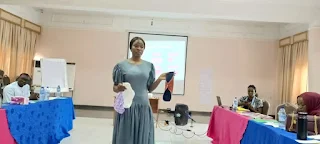By Khalid Idris Doya
Menstrual Health and Hygiene (MH-NoW), in collaboration with Population Services International (PSI) Nigeria, has organised a capacity-building workshop for selected journalists and media influencers in Bauchi State aims to raise awareness and promote menstrual health and hygiene across communities.
The training was designed to equip participants with comprehensive knowledge, communication skills, and resources to effectively support and educate adolescent girls and young women on menstrual health and hygiene management.
Speaking at the opening ceremony held at Chartwell Hotel, Bauchi, on Thursday, Gloria Obed, Program Officer for the MHH project under PSI, highlighted that the project's core objective is to increase awareness, improve access to menstrual products, and empower girls and women to manage menstruation safely and with dignity.
"This project started two years ago and currently operates in seven states; Bauchi, Sokoto, Kano, Lagos, Akwa Ibom, Nasarawa, and Plateau," she said.
According to Obed, the project has already trained community champions and key stakeholders in Bauchi, who return to their communities to share information about menstruation, menstrual products access, and proper hygiene practices.
"We also work closely with Primary Health Care (PHC) workers in Bauchi to ensure they are equipped to handle menstrual-related health concerns and provide necessary referrals. These health workers serve as a vital support system for women experiencing severe menstrual issues," she added.
She further explained that Menstrual Health Champions have been trained in schools, primarily teachers who guide young girls on how to use and dispose of menstrual products properly and recognise when to seek medical assistance.
"This project is ultimately about empowerment through knowledge. No girl or woman should suffer in silence or be considered 'sick' because of her period. When women and girls understand how to care for their bodies, it benefits everyone," Obed stated.
She emphasised that menstrual health is not just a women's issue but a societal concern that requires the support and understanding of men and boys as well.
"Men live alongside women in homes, schools, and communities. That means they also need to understand menstruation, so they can support their wives, daughters, sisters, and colleagues with empathy and respect," she added.
Gloria further said, "Whether by offering emotional support, ensuring access to menstrual products, or helping challenge harmful myths, male involvement is essential. When everyone understands menstruation, we break the silence, reduce stigma, and build a more inclusive society."
Also speaking, Hajiya Zuwaira Baba, the training facilitator and Gender Desk Officer at the Bauchi State Ministry of Health, said the training was intended to strengthen the capacity of media professionals to deliver accurate and inclusive information on menstrual health.
She emphasised the importance of media engagement in ensuring that reliable, relatable, and stigma-free messaging reaches the grassroots, including adolescents, women, men, and persons with disabilities.
"The media plays a crucial role in educating the public on the proper use and disposal of menstrual products, self-care during menstruation, and the importance of male involvement in creating a supportive environment," Baba said.
On the persistent challenges related to menstrual health in Nigeria, Baba noted that myths, misconceptions, and shame still surround the issue.
"These harmful beliefs affect how girls and women see themselves and how society treats them. That's why we are here: to break the silence, dispel the myths, and replace shame with confidence and knowledge," she noted.
Population Services International (PSI) Nigeria through its MH-NoW Program, is actively tackling the social challenges surrounding menstrual health by promoting the local production of affordable menstrual hygiene products, providing comprehensive menstrual education, and advocating for policies that support subsidised access to these essential products.








0 Comments